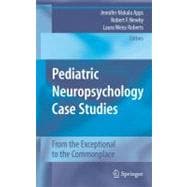
What is included with this book?
| Dangers of Childhood: Neurological Disorders | |
| Beating the Odds: Prematurity and Posthemorrhagic Hydrocephalus | p. 3 |
| Never, Ever Shake a Baby: Pass It On | p. 13 |
| Grand Larceny in the First Grade: Traumatic Brain Injury in the School-Aged Years | p. 23 |
| A Slippery Descent: Adolescent Traumatic Brain Injury | p. 33 |
| Steamrolled: Sports-Related Concussions | p. 43 |
| Bad Signs: Sickle-Cell Disease and Stroke | p. 51 |
| Life Interrupted: Medulloblastoma | p. 59 |
| The Mystery of the Falling Grades: Seizure Disorder | p. 69 |
| When Half a Brain is Better than One: Recurrent Seizures | p. 77 |
| Pathological Left-Handedness: Stroke and Seizures | p. 87 |
| Moving Forward: Psychotherapy with a Youth After Brain Injury | p. 97 |
| Family Matters: Psychosocial Factors on Neuropsychological Outcome | p. 109 |
| Dog Attack: Physical Trauma with Associated Brain Injury | p. 121 |
| Back to Life: Anoxic Brain Damage in a Near Drowning | p. 129 |
| How It Can All Go Wrong: Developmental Disorders | |
| The Energizer Bunny Meets Shirley Temple: Attention Deficit Hyperactivity Disorder, Combined Type | p. 141 |
| "He is not Working up to Potential": Atypical Attention Deficit Hyperactivity Disorder with Executive Weaknesses | p. 151 |
| Sorting Sounds: Reading Disability with Phonological Awareness Deficit | p. 159 |
| Well Compensated But Never Quite Solved: Lingering Dyslexia | p. 167 |
| Emily Confronts Her Fiercest Bear: Word Reading Disorder with Naming Speed and Phonological Deficits | p. 175 |
| A Tale of Two Assessments: Reading Fluency | p. 191 |
| Lost in Space: Nonverbal Learning Disability | p. 201 |
| Beyond Diagnosis: Applied Behavior Analysis Treatment of Moderate Autism Spectrum Disorder | p. 217 |
| When Quirks and Quick Learning Create a Quandary: Mild Autism | p. 231 |
| On Eggshells: Pediatric Bipolar Disorder | p. 245 |
| It Helps to Know Genetic Basis: Williams Syndrome as an Example of Cognitive Disability | p. 255 |
| Mixed Bag: Tics, Compulsions, and More | p. 267 |
| Things that Go Bump in the Night: Interesting Questions and Controversies for Our Field | |
| A "Sensational" Way to Understand and Serve Children: Illustration of a Sensory Processing Model | p. 281 |
| Sense and Sensibility: Relating Behavior Control Issues with Self-Regulation of Sensory Input | p. 295 |
| Elusive, Inclusive, or Conclusive? (Central) Auditory Processing Disorder | p. 307 |
| A Little of This, A Little of That: (Central) Auditory Processing Disorder | p. 325 |
| A Hunt for the Elusive Neuropsychological Impairment: Conversion Disorder | p. 335 |
| A Mystery of Perplexing Symptoms: Neuropsychological Assessment in a Case of Dysautonomia | p. 343 |
| Description of Tests and Reported Scores | p. 351 |
| Index | p. 357 |
| Table of Contents provided by Ingram. All Rights Reserved. |
The New copy of this book will include any supplemental materials advertised. Please check the title of the book to determine if it should include any access cards, study guides, lab manuals, CDs, etc.
The Used, Rental and eBook copies of this book are not guaranteed to include any supplemental materials. Typically, only the book itself is included. This is true even if the title states it includes any access cards, study guides, lab manuals, CDs, etc.